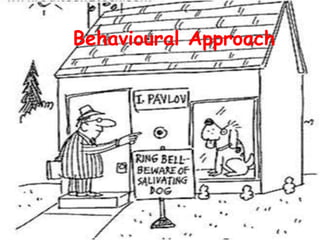
Behavioural approach
- 2. Assumptions All behaviours (normal and abnormal) are learned Learned responses from environmental stimuli Study observable behaviour
- 3. Causes 1.Classical Conditioning Learning by association 2. Operant Conditioning Learning by reinforcement 3. Social Learning Learning by watching others being rewarded
- 4. Classical Conditioning - Learning by association - Creating a new response to a stimulus - Classical conditioning schedule UCS = UCR UCS + NS = UCR CS = CR
- 5. Operant Conditioning Learning by reinforcement Reward = encourages certain behaviours (increases chances of them being repeated) Punishment = discourages certain behaviours (decreases chances of them being repeated)
- 6. Social Learning Theory Operant Conditioning from a distance... Behaviours can be encouraged/discouraged by watching others being rewarded/punished for them – this is known as vicarious learning
- 7. How would the behavioural approach investigate abnormality? Animal Studies The same basic laws of learning apply to human and non-human animals What do you think the problem would be in using non- human animals? Extrapolation – it’s difficult to apply the findings from non-human animal research to humans
- 8. Scientific For example, the behavioural approach focuses on what is observable and measureable This is positive because it allows concepts such as classical conditioning to be demonstrated scientifically – allowing for empirical support for the theory
- 9. Deterministic For example, the approach suggests that if we are rewarded for losing weight that we will develop an eating disorder This is a weakness because it ignores the concept of free will and the idea that someone might exercise conscious control over their behaviour
- 10. Reductionist For example, it suggests that mental illnesses are the result of reward/punishment (e.g. Rewarded for aggression results in more aggression) This is a weakness because it reduces the complex mental disorders down to basic elements, it’s too simplistic!
- 11. Extrapolation For example, rats have been widely used by behaviourists to demonstrate conditioning (so the research tests animal behaviour – not human) This is a weakness because that research can’t be applied to humans because they are biologically different and may not respond in the same way at animals
- 12. Key terms / Buzz words Deterministic B.F. Skinner Classical Learning Social Learning Punishment Operant Reward Encourage Reductionist Vicarious Environment Animal Studies ‘Little Albert’ Scientific Association Extrapolation Extrapolation Rats/pigeon